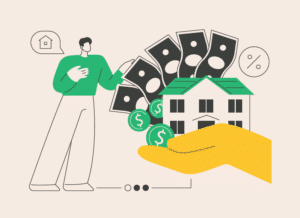
Top economists don’t expect the average mortgage interest rate to drop below 6 percent in 2025, but local lenders still see cause for optimism this year. iStock illustration
Residential lenders will have to continue to navigate elevated interest rates in 2025 but competition for customers will not be as fierce, some of the state’s top mortgage professionals predict.
The average interest rate on a 30-year home loan topped 7 percent last week according to mortgage-buyer Freddie Mac, as bond investors sweat concerns about Trump administration policies reigniting inflation.
And after interest rate cuts at the end of 2024, the Federal Reserve has projected only two reductions in its benchmark rate this year, a more cautious outlook than experts expected as recently as the fall of 2024.
But while top economists say it’s not looking likely that the average mortgage interest rate could drop below 6 percent anymore, many top mortgage professionals in Massachusetts say that may not matter as much anymore to homeowners who felt locked into low mortgage rates.
“Everything in the world is psychological and I think that people’s minds got really screwed up with COVID, for a million different reasons but as far as the interest rates just being probably one to 2 percent lower than they’d ever been in history,” Cross Country Mortgage loan officer Andrew Marquis said. “A big swath of people kind of got tricked into those lower rates and thinking these are the new rates and this is what it’s going to be. After that, when the rates shot up to 5, 6, 7 percent, it really halted the market for a year to two years.”
Seller Mindset Changing
Rates close to 5 percent or 6 percent are the historical norm for well-qualified buyers, Marquis said, despite the low rates of the 2010s and the ultra-low rates of the pandemic years.
“I think there’s still people out there that will say, ‘Hey, I’m not doing this until rates go lower.’ Rates may never go lower,” he said. “But I think there’s still a bigger percentage of people that are realizing this is what interest rates are.”
Only around 75 percent American home mortgages have interest rates below 5 percent, down from 90 percent in 2022, according to a July 2024 report from real estate data firm ICE.
Guaranteed Rate’s Shant Banosian acknowledged the psychological aspect of rate cuts but on the opposite side of the spectrum. He believes that no matter how high rates get, even the most minuscule of cuts can create a positive outlook on the market.
“I found that in my career that any time interest rates go down, it creates excitement, and it creates affordability, and it creates a little bit of fear missing out too, which all ultimately have people rushing back into the market,” Banosian said. “In fact, we saw it happen over the summer this year, when rates came down all the way from July through September.”
Life Events Driving Listings
While interest rates receive a lot of headlines, BankFive Senior Vice President Patrick Deady noted that the availability of homes on the market is the real factor that affects buyers – many of whom are also the sellers the Massachusetts housing market relies on for inventory.
And high interest rates, he said, are causing fewer homes to hit the market.
“The greatest issue for our buyers now is still inventory,” he said. I think as time goes on that should maybe loosen up a little bit in [20]25 but we’re not putting new housing out there in New England.”
Only significant life events like new jobs, divorces and deaths will motivate homeowners to enter the market, Deady said.
“I do think as time goes on, folks who’ve been married to their lower interest rate mortgages and maybe holding on and not making a move, their particular situation, whether they’re heading towards retirement, downsizing, upsizing, they’re going to have to make those decisions. They can’t put them off forever, regardless of what the rate is,” he said.
Nevertheless, Marquis, Banosian and many others interviewed for this story said they were optimistic 2025 could see an uptick in home sales – and thus mortgage demand – over last year.
And when it comes to converting those potential seller-buyers into mortgage customers, Leader Bank head of residential lending Sean Valiton believes that having loan originators that customers can trust is key to helping them navigating the mental hurdle of the interest rate environment.
“With our retail model and our highly seasoned loan officers – very high-performing loan officers – it’s about building trust,” he said. “It’s about the consultative approach of sitting down with a client, finding out what their needs are, and then being real with what the market looks like and what they should be expecting out there – and then building trust around the fact that they will have options with you in whatever scenario that they run into while they’re out there shopping and that we understand.”

Sam Minton
Competition Cuts Could Help
If predictions of more home sales in 2025 come through, it appears that competition across the industry is still poised for a reduction.
In recent years, on both the buyer and lender side competition has been high due to a lack of inventory.
“Generally, I find that competition from the lending standpoint, gets more fierce when rates go up, because everybody’s scrapping and clawing through the same loans, because there’s less of them,” Banosian said. “When rates come down, it’s generally not as fierce because people tend to be doing okay as rates improve because application volume goes up, lock volume goes up, and on top of that, they have refinance volume they can also handle as well.”
Some financial institutions are also scaling back their mortgage lending as they try to reshape their balance sheets for the new interest rate environment. And some loan originators and mortgage companies have been driven out of business.
“You’ve also seen a lot of the kind of fly-by-night originators, the part-timers, a lot of those people have not renewed their NMLS licenses,” Marquis said. “So, if there’s less folks in the business, they’re just going to have to be less competition and I think as we see more transaction and less lenders and originators to fulfill that that business, the less the competition would be.”





